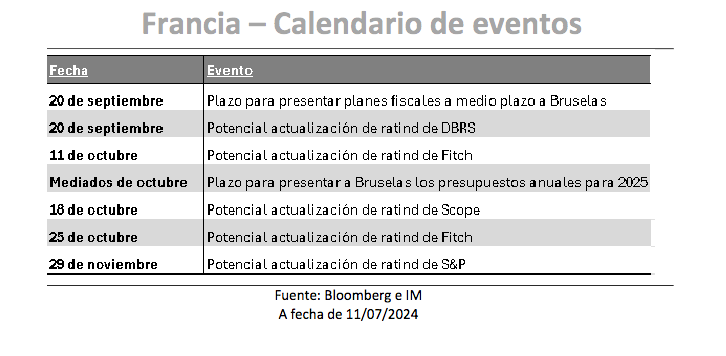Intermoney | In sovereign debt, the spread between the OAT and the Bund seems to be normalising and currently stands at 66 bp. As we have been explaining from IM, the governing coalition will have little room to expand spending and widen the deficit, considering that Brussels had put France in the excessive deficit procedure. What’s more, the next French government would have to stump up €15 billion in additional tax revenues or savings to meet the requirements of the European authorities. Given that the current finance minister, Bruno Le Maire, has pledged to keep public finances on a steady course when he leaves office, the European Commission’s demands offer an idea of the challenge facing President Emmanuel Macron in forming a coalition government whose likely constituent parties want to expand spending.
Agreeing any spending cuts in France will be a difficult task after the early elections. The left-wing alliance won the elections, but failed to win a majority of lawmakers, and the result is a parliament without consensus and riven by divisions over budget policy. The outgoing government in Paris has pledged to take emergency measures to cut spending this year, and Le Maire outlined details of a further €10 billion in savings. According to Le Maire, the next government must comply with the EU’s new fiscal rules to ensure its international credibility. That means sticking “rigorously” to an existing long-term plan that foresees adjustments of 0.8% of GDP this year, 1.2% in 2025 and 0.5% and 0.7% in the following two years. The parties in position to form the next administration have got their fingers caught in the vice by promising measures that would expand spending further and it is clear that cancelling any measures would generate clear dissatisfaction among their own voters.
France’s plans are to request a longer horizon for controlling the budget deficit, seeking an extension of four to seven years, although the executive aims to reach the 3 per cent ceiling by 2027. Whoever governs must accept that they will have to make sacrifices in certain areas. For example, implementing a reform of the unemployment insurance system seems logical, however much it may cost French politicians.
However, at this point we must be aware that a minority government is not particularly strong and this plays in favour of broadly meeting the commission’s demands on deficits.






